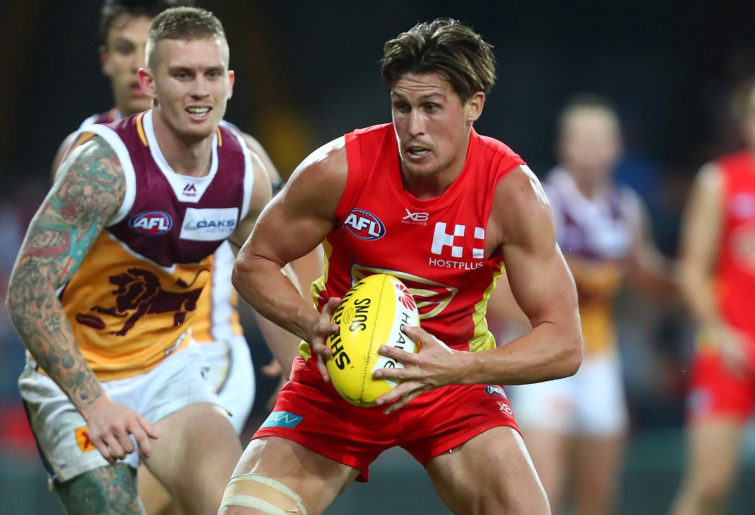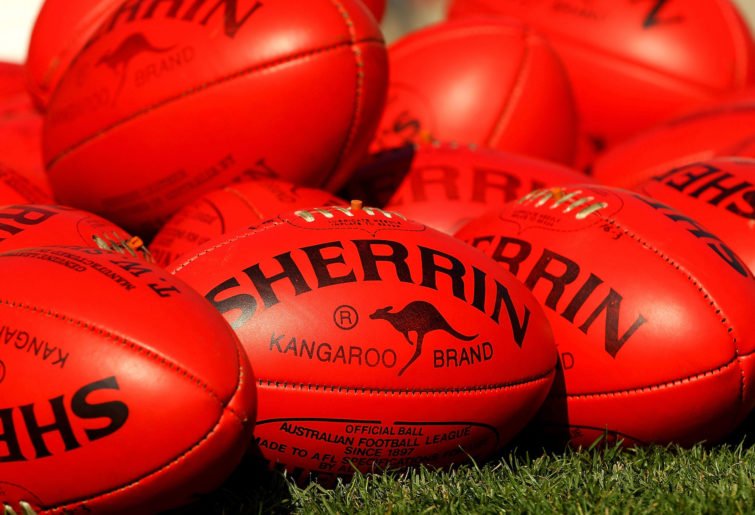Ten months ahead of the 2010 AFL National Draft, the newly formed GC17 pre-cast what would become its number one pick on a Western Australian kid to be the player they would build a franchise around.
That prodigy was a 17-year-old David Swallow, who had just earned under-18 All Australian selection as a bottom-ager with a November birthday and would go on to win the prestigious Larke Medal in his draft-age year as a consensus number one draft pick.
Coming into the AFL as the younger brother of North Melbourne best and fairest winner, Andrew Swallow, may have set the bar high, but the younger Swallow came in at 18 years of age in his debut season and played every game bar one, featuring his signature brand of hard nut footy in the Suns’ inaugural year.
The Suns midfield at that time was the envy of the AFL, with Gary Ablett Junior playing a star turn and Michael Rischitelli leading blue-chip recruits Harley Bennell and Dion Prestia through a baptism of fire as the new franchise struggled to a three-win, 19-loss inaugural season.
The future captain had his breakout year in 2014 in what was the Gold Coast club’s best year until the Collingwood game, when Suns hearts were broken at the sight of Gaz leaving the field with a ruined shoulder, but Davey put the team on his back and carried them to victory in a three-Brownlow vote performance.
After the Suns crashed out of contention in 2014, he would only go on to play six more games in the following season, then the 2016 season was a total write-off as his injuries threatened to put an early end to his career.
In spite of playing 73 matches of a possible 88 in his first four seasons, a posterior cruciate ligament injury sustained in the club’s first-ever game against Greater Western Sydney in 2012 restricted him to just 12 games and he struggled to finish the season, missing three of the final six games in 2013.

(Photo by Chris Hyde/Getty Images)
Swallow did his other PCL in Round 4 of the 2015 season, then made a brief midseason attempted comeback, before opting for a double knee reconstruction at just 22 years of age.
The devastating injury-enforced layoff came as the club endured catastrophic blows in the form of injuries to fellow key midfielders, the infamous drug scandal and departures of key talent during the tumultuous reign of Rodney Eade.
When Swallow returned to footy in 2017, it was a revitalized Suns outfit that won some stirring victories with Gaz and Spitta leading the team once more with the injection of Jarrod Witts in the ruck, although several shortcomings such as Sam Day’s horrific hip injury and Tom Lynch’s own issues with PCL degeneration saw the Suns fade and Rocket take his leave.
2018 began brightly again under Stuart Dew, although the depth issues from the Scott Clayton era and mounting injury list once again sunk the Suns during their horror schedule enforced by the Commonwealth Games and a trip to China, while the ongoing Lynch saga had club morale at an all-time low.
This was the time when David Swallow’s leadership, despite a pair of wonky knees, came to the fore as the club faced losing both of its co-captains and a clutch of other wantaways, with the spiritual leader of the club taking steps to stamp his impression on the player culture.
Only those in the room will be able to verify it, but a player delegation led by Swallow and the others in the leadership group brought some of the younger players into a team meeting to confront Tom Lynch on his by then public plans to defect to Richmond.
It was a defining moment in the club’s short history.

(Photo by Mark Dadswell/Getty Images)
Players heard Lynch’s reasons for leaving, then gave him their own feedback on how he’d handled the situation and what his desertion meant to them.
One player is said to have told his captain that anything he did from then on would not be a genuine achievement.
The consensus agreement was that Lynch should be immediately stripped of the captaincy and leave the club, which was later amended to allow him to continue rehab and attend the club best and fairest.
Leaders stand up during a crisis and it surprised nobody that David Swallow was named co-captain after Steven May also decided to leave the club at season’s end.
Swallow’s role in that critical period was to provide leadership that very few possess, keeping the playing group united as changes swept through the club.
Although Ablett had captained the club for its first six seasons, Rischitelli and Jarrod Harbrow had deputized in the role when Gaz was out injured, with Swallow, Lynch and May also taking their turns.
But it was obvious that Swallow should continue to lead and the decision to pair him with Witts made sense as the two players had their best seasons to date in a side that was decimated by experienced players leaving nothing else for it but a tranche of debutants to get blooded in a wooden spoon year.
With 2019 behind him, Swallow could hardly have asked for a better start to 2020 in the preseason, only for his side to get thrashed in the opener and for him to cop a suspension.
Whatever happened to that team in lockdown, the way they performed on the recommencement in Round 2 is testament to the player leadership that even without their captain they could give the premiership favourites a black eye in one of the upsets of the decade.
This shows the value of the man that he could still play his part without taking the field, even knowing through the entire season shutdown that he would be sidelined.
It is something he’s been no stranger to during his extended layoffs and can even be seen in the behaviour of young Matt Rowell, as he too played an assistant coaching role during the season from the bench.
In the penultimate round of 2020 when Stephen Coniglio was dropped, scribes scanned the record books for when a club captain had last been omitted for poor form.
They needn’t have bothered, because David Swallow had been “rested” in Round 15 with no apparent injury or form issue other than a compressed schedule and inability to continue to back up on successive short turnarounds.
In fact, Cogs is a very good yardstick for Spitta, having been a young leader and now captain of an expansion team with enormous expectations that must now be tempered somewhat due to the poundings their bodies have taken leading young teams through the formative years of the AFL’s dogged expansion.
Andrew Swallow played 224 games before the rigours of AFL enforced his retirement, although he did run around a few times in the NEAFL at the Suns wearing baby brother’s number 24 with a very young side that needed to draw top-up players from the coaching staff.
If David can reach that number of games from his current total of 154 from a possible 215, it will have been a stellar achievement, considering the seriousness of his injuries in his early 20s, yet the way he has managed to get his body through the majority of games in the past four seasons gives an indicator as to how he’ll manage the next four.

David Swallow (Michael Dodge/Getty Images)
Swallow is contracted until the end of the 2024 season, with any extension on that predicated upon his ability to continue playing his rugged inside game without his knees giving way each year past his current age of 28.
What the diagnosis is even now is a heavily guarded secret for obvious reasons, but what is known is that he has degenerative knee issues in both legs that will prevent him from playing a prolonged career.
Anyone who saw him knocked out by a strong ball-and-all Patrick Cripps tackle in 2019, where Swallow himself admitted he was so dazed that he “acted like a drunk at a party who doesn’t want to leave” and missed the following week shows that even concussion could be a factor that leads to an early retirement.
Without putting the mocker on the Suns’ best player over the ten seasons of their existence, he is much closer to the end than the beginning, with the question being: will he go sooner rather than later?
Is he still their best player or even in their best?
He’s never been their best player at any given time, although he arguably beat Gaz to the award in 2014, but he is the spiritual leader and easily in the best 22 because of what he brings as a package.
So where does he play in 2021?
Undoubtedly, he’s got to play in the guts from the opening bounce, although a stat that has been getting sneakily better on his sheet under Dew is his marking and ability to get forward, so it makes sense for him to be playing fewer midfield minutes and resting forward to provide another avenue to goal.
However, the elephant in the room is his durability to continue playing long seasons being the bell cow for clearances in the middle, while his heirs mature enough to take over copping the rough stuff without succumbing to the same kind of abuse he endured from a tender age.
Here the judgment has to be harsh and heartless, because if he starts to become the kind of player keeping a future star out of the side on past achievements while his form suffers, then what’s the point of recruiting A-grade talent at the draft?
Captaincy no longer means guaranteed selection after 2020, especially when managing a player during the long stretch is more beneficial to the player and the team, so a 22-game season shouldn’t be an automatic expectation.
Here is where Stuart Dew’s coaching faces a defining examination, because the selection policy of playing favourites and persisting with out-of-form players cannot be maintained during a campaign with finals on the line or even building a playing culture where form in the second tier does not get rewarded.
Should that mean Swallow’s captaincy be required to be given up, there’s no shortage of candidates to join Witts, although 2021 is not the year for that and even without the C next to his name, Swallow will continue to be the true leader of the club until he gives it away.
David Swallow may not go down as a classic number one draft pick, but it has to be one of the most inspired picks in recent history given all he has achieved in the face of massive adversity, particularly in light of his early embrace of the start-up club and the passion he has about its future.
When asked about the potential of his team and their desire to succeed, Swallow replied: “Nobody wants it more than I do.”
2021 shapes as a year where the Suns’ destiny may once again coincide with the fortunes of their courageous captain.
He epitomises the last line in the seldom-heard song.
“We are the team who never say die!”































































































